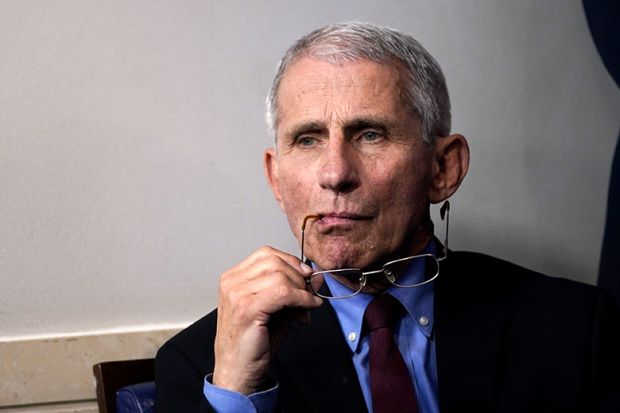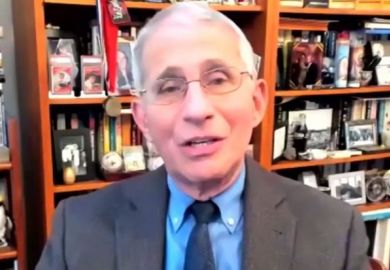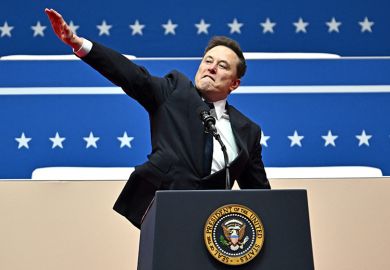After one of the most consequential careers in government science, US presidential adviser Anthony Fauci is about to become an intriguing – and perhaps irresistible – option for academia.
Dr Fauci, the decades-long director of the National Institute of Allergy and Infectious Diseases, and now the chief medical adviser to the president, is retiring from those posts at the end of the year.
And after spending the past couple years becoming the face of federal policy on the Covid pandemic, he is subtly letting US higher education know he will be open to offers.
In an interview with Times Higher Education, Dr Fauci made clear emphatically and repeatedly – in accordance with government rules – that he’s not thinking about or entertaining any kind of job offers until he officially leaves the National Institutes of Health at the end of December.
“I am doing nothing” toward finding new employment, he said. “I am not talking to people, I’m not negotiating with people, I’m not hiring people, until I step down here on 31 December.”
Yet Dr Fauci left no doubt that, at age 81, he does not plan to stop working, and has been thinking at least a little bit about what that future will look like.
He said he is not closing off any options, but described the prospect of some kind of posting in academia as very high on – if not at the top of – his list. He said he probably would look for an academic medical centre, where he could give lectures and advise, although he acknowledged his high-profile government experience could also have value for schools of politics and communications. He said he’s not especially interested in teaching students. He wants to stay in the Washington area and work from an office, but noted that many top academic institutions have some kind of physical presence in the capital region.
“My primary modus operandi will be writing, lecturing, travelling at different meetings, to try and discuss things that relate to my almost 60 years of experience at the NIH as a scientist and my 38 years of experience as the director of a very large research institution,” Dr Fauci told THE.
“I think that’s a rather unique experience that I’ve had, that very few other people have had,” said the infectious disease specialist, who gained global renown for resisting scientifically outlandish Covid-fighting proposals during the Trump presidency and persistently pushing back against its Republican allies in Congress.
“And what I’d like to do is utilise the benefit of that experience in not only inspiring young scientists, would-be scientists and students, but also people who are currently involved in policy positions, that I might serve as a sounding board or as a source of advice.”
Talent recruiters with experience in higher education and academic medicine said that while Dr Fauci’s political battles might cause some institutions or their board members to hesitate, their overwhelming sense is that US universities could – and should – end up competing aggressively for his services.
“As a hire, he would be a whale – he would be a huge get for anybody,” said Matthew Tzuker, a recruiter in academia and academic medicine now at the 1,700-provider MaineHealth system.
“He’s far and beyond just about anybody else you could rank as a scholar – he’s like Babe Ruth and Muhammad Ali all kind of combined into one.”
Register to continue
Why register?
- Registration is free and only takes a moment
- Once registered, you can read 3 articles a month
- Sign up for our newsletter
Subscribe
Or subscribe for unlimited access to:
- Unlimited access to news, views, insights & reviews
- Digital editions
- Digital access to THE’s university and college rankings analysis
Already registered or a current subscriber? Login








